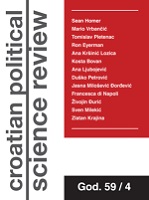Transgenerational Trauma in Comic Books: The Cases of Heimat and Sunday’s Child
Transgenerational Trauma in Comic Books: The Cases of Heimat and Sunday’s Child
Author(s): Kosta BovanSubject(s): Visual Arts, Family and social welfare, WW II and following years (1940 - 1949), Politics of History/Memory, Identity of Collectives
Published by: Fakultet političkih znanosti u Zagrebu
Keywords: Comics; Graphic Novel; Trauma; Transgenerational Trauma; Perpetrator Trauma;
Summary/Abstract: Transgenerational trauma refers to the situation where children are traumatized by the experiences of their (grand)parents. It is a unique combination of individual, familial, and collective (cultural) traumatic processes. The intertwining of these processes poses a particular representational challenge, one that could be overcome by the comics medium. It was proposed by various authors that the visual language of comics is particularly useful for portraying traumatic experiences, such as the fragmentation of time, trauma’s belatedness and the haunting presence of the past. In this article I analyse two graphic novels, Heimat: A German Family Album by Nora Krug and Sunday’s Child by Serena Katt, both of which explore the transgenerational perpetrator trauma, and the roles the authors’ families had during the Second World War. I show how the authors use representational and aesthetic choices that help them convey the process of fact-searching as well as emotional engagement and imagination that is characteristic for transgenerational trauma.
Journal: Politička Misao
- Issue Year: LIX/2022
- Issue No: 04
- Page Range: 116-145
- Page Count: 30
- Language: English

